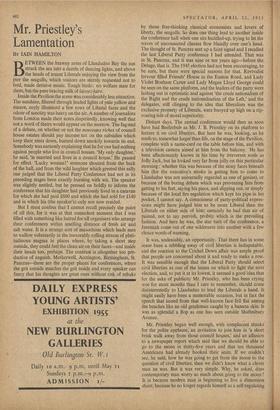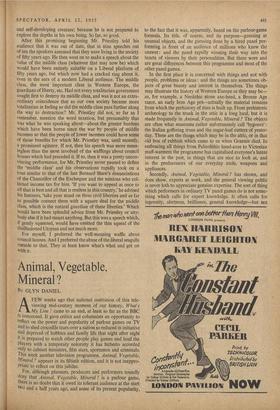Lamentation
BY LAIN HAMILTON BETWEEN the brawny arms of Llandudno Bay the sun struck the sea into a dazzle of dancing lights, and above the heads of truant Liberals enjoying the view from the pier the seagulls, which visitors are sternly requested not to feed, made derisive music. Tough birds : no welfare state for them, but the pure bracing milk of laissez-faire.
Inside the Pavilion the scene was considerably less attractive. The sunshine, filtered through leaded lights of pale yellow and mauve, coyly illumined a few rows of Liberal faces and the odour of sanctity was heavy on the air. A number of journalists from London made their notes dispiritedly, knowing well that not a word of theirs would appear on the morrow. The fag-end of a debate, on whether or not the nouveaux riches of council house estates should pay income tax on the subsidies which keep their rents down, burned down smokily towards its end. Somebody was earnestly explaining that he for one had nothing against people who live in council houses. 'My only daughter,' he said, 'is married and lives in a council house.' He paused for effect. 'Lucky woman!' someone shouted from the back of the hall, and from the wild laughter which greeted this sally one judged that the Liberal Party Conference had not in its preceding stages been exactly bursting with wit. The speaker was slightly nettled, but he pressed on boldly to inform the conference that his daughter,had previously lived in a caravan for which she bad paid £600 and which she had sold for £140 and in which his (the speaker's) only son now resided. But I rimst confess that I cannot recall precisely the point of all this, for it was at that somnolent moment that I was filled with something like hatred for all organisers who arrange their conferences within smelling distance of fresh air and salt water. It is a strange sort of masochism which leads men to wallow voluntarily in the inexorably rolling stream of plati- tudinous magma in places where, by taking a short step outside, they could feel the clean air on their faces—and inside their heads too, perhaps. The contrast is altogether too prb. ductive of anguish. Motherwell, Accrington, Birmingham. St. Pancras—these are the proper places for conferences, where the grit outside matches the grit inside and every speaker can fancy that his thoughts are great ones without risk of rebuke by those free-thinking classical economists and lovers of liberty, the seagulls. So does one thing lead to another inside the conference hall when one sits huddled-up, trying to let the waves of unconnected clauses flow blandly over one's head. The thought of St. Pancras sent up a faint signal and I recalled the last Liberal Party conference I had attended. That was in St. Pancras, and it was nine or ten years ago—before the Deluge, that is. The 1945 election had not been encouraging, to be sure, but there were special reasons for that. Revivalist fervour filled Friends' House in the Euston Road. and Lady Violet Bonham Carter and Lady Megan Lloyd George could be seen on the same platform, and the leaders of the party were lashing out in optimistic zeal against 'the crude nationalism of the Right and the crude nationalisation of the Left,' and the delegates, still clinging to the idea that liberalism was the exclusive property of Liberals, were buoyed up high on a rip- roaring tide of moral superiority.
Distant days. The annual conference would then as soon have had Beelzebub as Mr. J. B. Priestley on its platform to lecture it on civil liberties. But here he was, looking, as he tends to, somewhat larger than life, on the stage of the Pavilion, complete with a name-card on the table before him, and with a television camera aimed at him from the balcony. He has been affectionately known in his time by irreverent souls as Jolly Jack, but he looked very far from jolly on this particular morning: whether this was because of the stony faces beneath him (for the executive's stroke in getting him to come to Llandudno was not universally regarded as one of genius), or because of the boring debate which was preventing him from getting to his feet, saying his piece, and slipping out, or simply because of the local fire regulation which kept his pipe in his pocket, I cannot say. A connoisseur of party-political expres- sions might have judged him to be more Liberal than the Liberals on either side of him; certainly he had that air of pained, not to say peevish, probity which is the prevailing fashion. And here he was, the star turn of the conference. a Jeremiah come out of one wilderness into another with a few choice words of warning.
It was, undeniably, an opportunity. That there has in some sense been a nibbling away of civil liberties is Indisputable, and the reaction to the Crichel Down affair was ample proof that people are concerned about it and ready to make a row. It was sensible enough that the Liberal Party should select civil liberties as one of the issues on which to fight the next election, and, to put it at its lowest, it seemed a good idea that for the sake of publicity Mr. Priestley, who has been crying woe for more months than I care to remember, should come disinterestedly to Llandudno to lend the Liberals a hand. It might easily have been a memorable occasion, but in fact the speech that issued from that well-known face-fell flat among the benches like an old gentleman caught by a banana skin. It was as splendid a flop as one has seen outside Shaftesbury Avenue.
Mr. Priestley began well enough, with complacent thanks for the polite applause, an invitation to join him in 'a short brisk walk away from those council houses,' and an allusion to a newspaper report which said that we should be able to go to the moon in thirty-five years and that ten thousand Americans had already booked their seats. If we couldn't see, he said, how he was going to get from the moon to the question of civil liberties, then we didn't know what a clever man he was. But it was very simple. Why, he asked, does contemporary man worry so much about going to the moon? It is because modern man is beginning to live a dimension short; because he no longer regards himself as a selflregulating After this promising beginning Mr. Priestley told his audience that it was out of date, that in nine speeches out of ten the speakers assumed that they were living in the society of fifty years ago. He then went on to make a speech about the value of the middle class (whatever that may now be) which would have been entirely suitable on a Liberal platform of fifty years ago, but which now had a cracked ring about it, even in the ears of a modern Liberal audience. The middle class, the most important class in Western Europe, the guardians of liberty, etc. Had not every totalitarian government sought first to destroy its middle class, and was it not an extra- ordinary coincidence that as our own society became more totalitarian in feeling so did the middle class pass further along the way to destruction? Mr. Priestley did not, so far as I remember, mention the word taxation, but presumably that was what he was speaking about—about the greater burdens which have been borne since the war by people of middle incomes so that the people of lower incomes could have some of those benefits for which Mr. Priestley was, until recently. a prominent agitator. If not, then his speech was more mean- ingless than the most involved of the wafflings about council houses which had preceded it. If so, then it was a pretty uncon- vincing performance, for Mr. Priestley never paused to define the 'middle class' and his observations rapidly took on a tone similar to that of the late Bernard Shaw's denunciations of the Chancellor of the Exchequer and the minions who col- lected income tax for him. 'If you want to appeal at once to all that is best and all that is restless in this country,' he advised his listeners, 'take your stand on these civil liberties and as far as possible connect them with a square deal for the middle class, which is the natural guardian of these liberties.' Which would have been splendid advice from Mr. Priestley or any- body else if it had meant anything. But this was a speech which, If gently squeezed, would have emitted the thin squeal of the disillusioned Utopian and not much more.
For myself, I preferred the well-meaning waffle about council houses. And I preferred the abuse of the liberal seagulls Outside to that. They at least know What's what and get on with it.











































 Previous page
Previous page